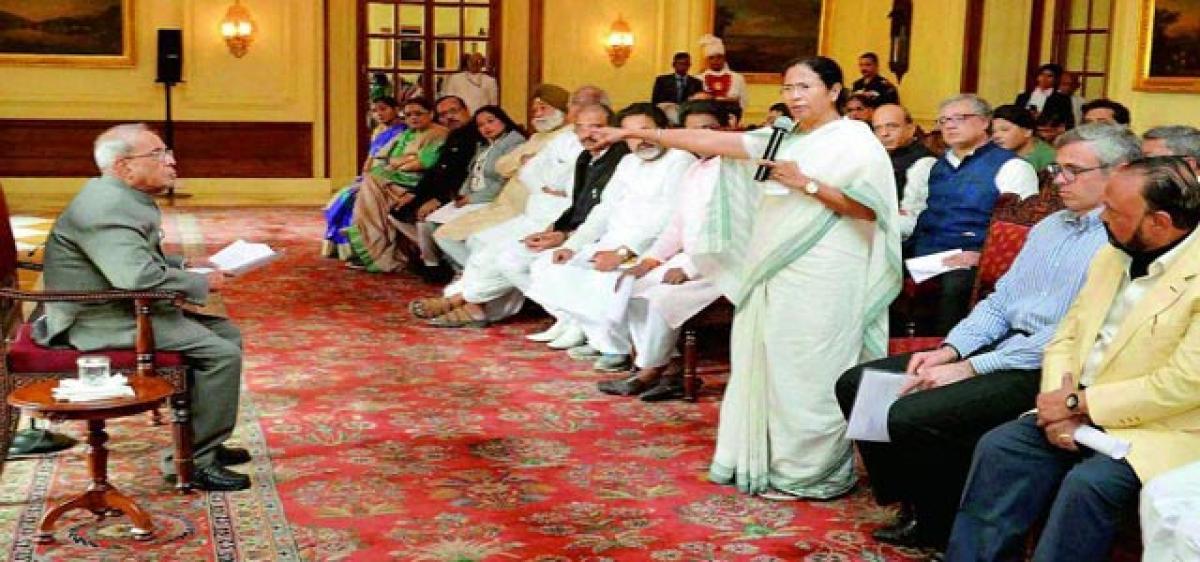Live
- Bathukamma reminds us of association of Telangana with nature: Seethakka
- Ticket sales commence for Indo-Bangla T20 match
- Now, Filipinos to relish rice from Telangana
- Revanth rescues tribal being exploited in Saudi Arabia
- Kantara’ song unveiled by Nikhil
- Owaisi demands arrest of UP priest for blasphemous remarks
- Nalgonda farmers support Musi development project
- Star producer Dil Raju unveils title poster of ‘Trikaala’
- Govt notifies HYDRA ordinance
- Should temples be free of govt control?
Just In

“The worst thing in this world, next to anarchy, is Government.” Undoubtedly, Henry Beecher was a futurologist who had November 2016 India in mind when he uttered these words.
“The worst thing in this world, next to anarchy, is Government.” Undoubtedly, Henry Beecher was a futurologist who had November 2016 India in mind when he uttered these words. Which so aptly describes the turmoil on the streets, endless queues for cash, left people begging for their own money, disrupted the agricultural cycle, destroyed business even as Prime Minister Modi tom-toms his fight against black money and demonitisation is a success. Yet the show goes on.
Amidst this mayhem and turmoil as people debated the positive and negative effects of demonitisation, politically it saw the banding together of 13 disparate opposition parties to oppose the Prime Minister’s scheme. Succinctly encapsulated by his predecessor Manmohan Singh: “Organised loot, monumental mismanagement and legalised plunder” of the common people. He warned of a drop in the GDP “by about 2 percentage points… an underestimate”.
Undoubtedly, this Opposition onslaught during the ongoing Parliament session has disturbed the BJP and could upset its applecart in the near future. For nine days running both Houses have been adjourned without an iota of work over demonitisation by the largest opposition unity seen even as the government failed to create a divide amongst the Congress, Trinimool, AIADMK, DMK, NCP, SP, BSP, BJD, RJD and JD(U) by underscoring their inherent contradictions.
Perhaps, what is agitating and worrying the Saffron Sangh is that not only did these parties submerge their mutual conflicts by challenging the government’s well thought-out counter-narrative but that “neutral” parties like Jayalalithaa’s AIADMK, Mamata’s Trinimmol and Naveen Patnaik’s BJD joined the Congress-led opposition to vociferously challenge the Government inside and outside Parliament. But for reasons best known to Jayalalithaa, it is a mystery why the AIADMK has turned against the BJP in spite of many Ministers and the party’s top brass regularly visiting the Chennai hospital. Adding to Modi’s discomfort is its Maharashtra ally Shiv Sena coming out against demonetisation.
Pertinently, despite being in a minority in the Lok Sabha, the Opposition is rubbing in a reverse message: They might not have the numbers but are successfully putting the government on the mat. The obverse holds true in the Rajya Sabha where the parties are using their numerical strength to hold the house to ransom. However, the biggest takeaway of this opposition unity is that stormy petrel Mamata is clearly positioning herself for leading the opposition charge against the BJP in 2019, dethroning JD(U) Nitish Kumar.
She has not only emerged as a key strategist but also honed her political acumen. One, she bandied them together, kept her ears to the ground advising them on what should be there next move. Two, by reaching out to bête noir Left Brigade to join her anti-Modi bandwagon, she has demonstrated that if the cause is important she is willing to bury the decades-long hatchet and join forces for the collective good.
There is no gainsaying that the BJP has only itself to blame for the mess it is in. At the same time for any credible and proper opposition unity, if not perfect, to survive and lead, it should be headed by the largest, second or major party leader. With Congress’s Rahul being dismissed as a non-serious political player sans respect by others and AIADMK’s Jayalalithaa unwell the sixth largest party Trinimool’Mamata has taken it upon herself to lead from the front.
It is too early to say whether this unity will hold as it would depend on how long the cash crunch continues and how it affects the economy at large. Modi’s emotional speeches of it serving the greater national good have struck a chord with the poor and middle class who seem to have bought his line that demonitisation is punishing the rich. No matter it has created a class divide for the first time.
By Poonam I Kaushish

© 2024 Hyderabad Media House Limited/The Hans India. All rights reserved. Powered by hocalwire.com







